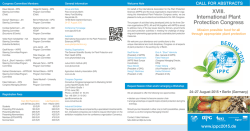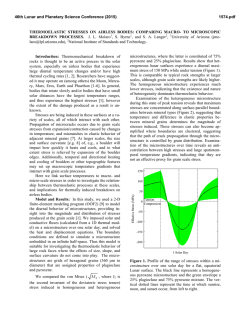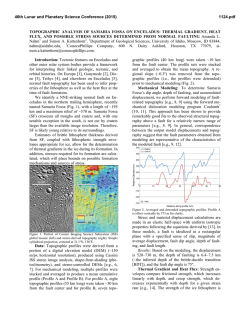
Number 10, October 2014 - International Association for the Plant
Number X October, 2014 REGIONAL SCIENTIFIC WORKSHOP ON BIOTIC STRESSES, CLIMATE CHANGE AND AGRICULTURAL PRODUCTION A regional scientific workshop with the theme ‘Biotic stresses, climate change and agricultural production in West and Central Africa’ took place at the Benin Marina Hotel in Cotonou, Benin, May 5-7, 2014. Co-sponsored by CORAF/WECARD, the Swiss Development Cooperation and IITA, and co-organized with the Benin national agricultural research institute (INRAB), the University of Abomey-Calavi (UAC), AfricaRice, Bioversity International and CIRAD, the workshop convened some 120 participants from 19 of the 21 CORAF/WECARD member countries, with active participation by IITA Board of Trustees and senior management staff. The keynote presentation was given by our IAPPS past president, Dr. Hans Herren, currently President of the Millennium institute, World Food Price and Right Livelihood Award laureate. In West and Central Africa, most of the current studies targeting climate change impacts on agriculture have been focusing on direct productivity by the crops (i.e. yields), or indirect impacts on livelihoods. So far, there has been no concerted effort to bring together researchers working on biotic stresses linked to climate changes affecting the region. It was therefore imperative, as a first step, to take stock of the available human and infrastructural resources in the region, as a starting point for defining a common regional strategy for managing biotic stresses and biodiversity under changing climatic conditions. Hence, the objectives of the workshop were as follows: • • • • To bring to the same table, for the first time, national and international scientists working in the West and Central African region, for sharing their respective experiences and visions about the impact of climate changes on agricultural production as influenced by biotic stresses, and approaches for their management. To take a snapshot of the current situation in each participating country with regard to emerging biotic stresses by crop and region as consequences of climate change, and their impact on agricultural productivity. To make an inventory of on-going and planned efforts at the national and regional level, including research programs/project, infrastructures and human resources in view of harmonizing common action plans into a regional strategy. To make recommendations towards a coordinated structure for research and training on sustainable management of biotic stresses as influenced by climate changes Workshop participants discussed details of biotic stresses in relation to climate changes in 3 groups according to broad agroecological regions: costal, sahelian and central African countries. Among major recommendation was the need to use standardized methods for collecting information related to the above topics, and to involve all actors, including farmers, extension agents and policy maker in the process of determining research priorities and for designing and disseminating interventions. One of the outcomes of the workshop was also the establishment of a regional research and training center for developing sustainable management options for crop pests (including diseases, nematodes and weeds) in the light of climate changes, to be based on the IITA-Benin station, under the umbrella of CORAF/WECARD, in partnership with INRAB, UAC, AfricaRice, Bioversity International and CIRAD. The installation of the center was symbolized by the unveiling of an inaugural plaque by the Honorable Minister of Agriculture of Benin, Mme Fatouma Amadou Djibril, together with the President of the Governing Board of CORAF/WECARD, Dr. Ibet Outman Issa, and the Chair of the IITA Board of Trustees, Prof. Bruce Coulman. Dr. Manuele Tamò IITA, Country Representative in Benin Editor, IAPPS Newsletter E-mail: [email protected] NEW BOOK ON BIOLOGICAL CONTROL OF PLANT DISEASES A new book on "Biological control of plant diseases in Latin American and the Caribbean" has hit the shelves. Edited by W. Bettiol, M.C. Rivera, P. Mondino, J.R. Montealegre and Y.C. Colmenárez, this book summarizes the history, current status and perspectives of biological control of plant diseases for several Latin American and Caribbean countries. We are giving below both the Spanish and the English abstract of the book. Resumen en Español En esta publicación se presentan la historia, situación actual y perspectivas del Control Biológico de enfermedades de plantas en América Latina y el Caribe. Esta información podría servir de base para la implementación de políticas públicas destinadas al fomento de estas tecnologías en la producción vegetal. A su vez, investigadores, académicos, estudiantes, profesionales y técnicos interesados en control biológico de enfermedades de las plantas, encontrarán en este libro información acerca de las experiencias, éxitos y dificultades encontradas en esta parte del mundo por parte de quienes han trabajado en el desarrollo de estas tecnologías en la región. Para este libro, se invitaron a diferentes especialistas de los países, quienes escribieron el capítulo correspondiente. La invitación tuvo una respuesta positiva de parte de investigadores de Argentina, Bolivia, Brasil, Chile, Colombia, Costa Rica, Cuba, Ecuador, Honduras, México, Nicaragua, Panamá, Paraguay, Perú, República Dominicana, Uruguay y Venezuela, mientras que para la región del Caribe, se escribió un capítulo que incluye información recabada en diversos países de esa zona, que puede usarse como ejemplo y punto de partida. Este libro es el resultado del esfuerzo conjunto de especialistas de esos países y de los editores de Wagner Bettiol, Marta C. Rivera, Pedro Mondino, Jaime R. Montealegre y Yelitza Colmenárez (de Argentina, Brasil, Chile y Uruguay) quienes pensamos que es necesario impulsar, incentivar e incrementar el uso de esta tecnología en nuestra región y aportar un marco histórico para esta área de la fitopatología en el continente. Para descargar este libro: http://portal.fagro.edu.uy/index.php/intensific-agr/file/367-control-biologico-de-enfermedades-de -plantas-en-america-latina-y-el-caribe.html Abstract in English The information contained in this book provides the basis for the implementation of public policies to promote biological crop protection. Researchers, faculty staff, students, professionals, farmers and technicians interested in biological control of plant diseases, will find in this book information about the experiences, successes and difficulties faced by researchers and implementers in the isolation, evaluation, registration and application of biocontrol agents in the Latin America and the Caribbean. The editors of this book invited specialists to write the chapters related to each country. The invitation had a positive response from researchers from Argentina, Bolivia, Brazil, Chile, Colombia, Costa Rica, Cuba, Ecuador, Honduras, Mexico, Nicaragua, Panama, Paraguay, Peru, Dominican Republic, Uruguay and Venezuela. For the Caribbean region, a chapter is presented containing information that was compiled about the experiences on biocontrol of plant diseases that some countries in this region have published. This book is the result of joint efforts of plant pathologists and researchers from these countries and editors from Argentina, Brazil, Chile and Uruguay. Congratulations to Dr. Wagner Bettiol from EMBRAPA Environment, who took the initial challenge to encourage all of us. The book is available for downloading at the following link: http://portal.fagro.edu.uy/index.php/intensific-agr/file/367-control-biologico-de-enfermedades-de -plantas-en-america-latina-y-el-caribe.html Dr. Nora Altier IAPPS Coordinator Region XV (South America) E-mail: [email protected] The IAPPS Newsletter is published by the International Association for the Plant Protection Sciences and distributed in Crop Protection to members and other subscribers. Crop Protection, published by Elsevier, is the Official Journal of IAPPS. IAPPS Mission: to provide a global forum for the purpose of identifying, evaluating, integrating, and promoting plant protection concepts, technologies, and policies that are economically, environmentally, and socially acceptable. It seeks to provide a global umbrella for the plant protection sciences to facilitate and promote the application of the Integrated Pest Management (IPM) approach to the world’s crop and forest ecosystems. Membership Information: IAPPS has four classes of membership (individual, affiliate, associate, and corporate) which are described in the IAPPS Web Site www.plantprotection.org. The IAPPS Newsletter welcomes news, letters, and other items of interest from individuals and organizations. Address correspondence and information to: Manuele Tamò Editor, IAPPS Newsletter IITA-Benin 08 B.P. 0932 Tri Postal, Cotonou, Republic of Benin E-mail: [email protected]
© Copyright 2026


